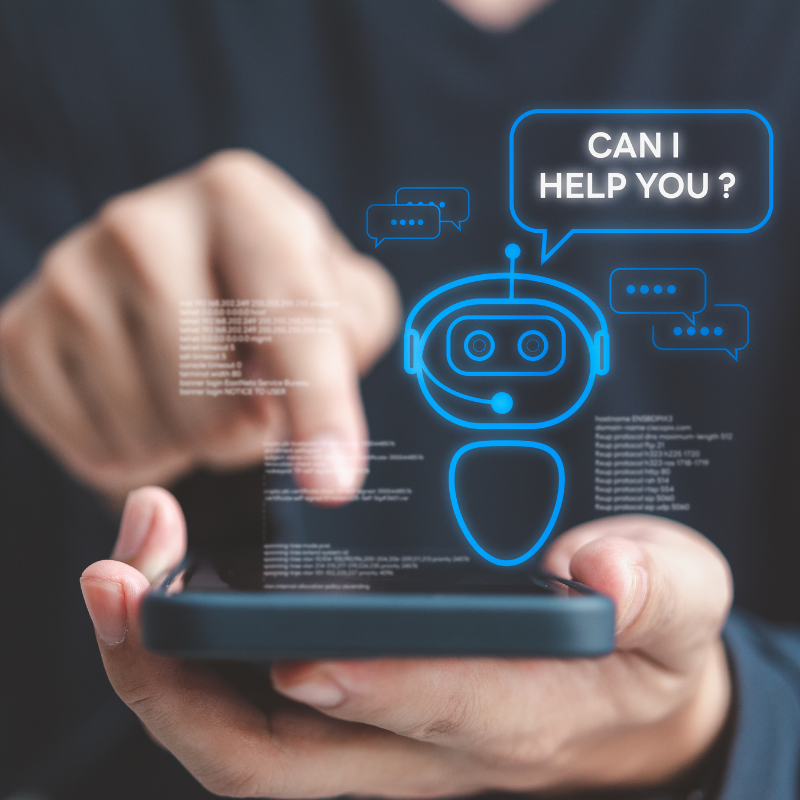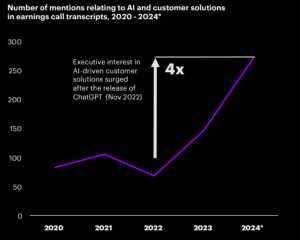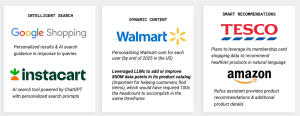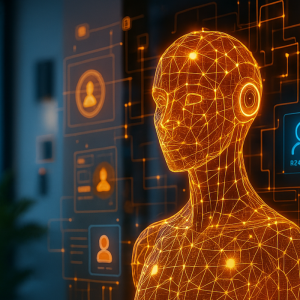Personified AI

Key Takeaway:
Generative AI is becoming the front line of brand interaction—shifting from tool to personality. As 84% of Europeans demand disclosure when speaking to AI (Dentsu), brands must ensure interactions are trustworthy, transparent, and emotionally aligned. Examples like Spotify’s AI DJ, Duolingo Max, and NatWest’s AI chatbot show how personified AI can blend context, tone, and responsiveness at scale. In retail, 1:1 experiences powered by GenAI are driving conversion lifts (Target) and are expected to unlock $570B in potential growth (BCG). But as AI powers and multiplies micro-moments, brands must balance performance with personality to remain distinct, sustainable, and credible in the algorithmic era.
Trend Type: Social & Business
Sub-trends: Personified AI, Retail's Personalization Imperative, Micro-Moments Multiply, AI Embedded Life
AI as Brand Interface in an Algorithmic World
According to Gartner, by 2028, at least 15% of day-to-day decisions will be made autonomously by AI—up from 0% in 2024. AI agents are evolving from tools to brand representatives, interacting through voice, text, and increasingly multimodal experiences (refer to AI Agents trend, to know more!). This requires a fundamental shift in how companies think about brand presence—no longer just visual and verbal, but behavioral and relational. According to Accenture, executives are starting to understand the importance of customer context to personified AI.

Source: NextAtlas - YOY Global Consumer Values Growth, 2024
For personified AI to create meaningful customer interactions, it needs new types of customer context. Demographic information and purchase history are not enough— the best AI will also leverage past conversations to inform future ones. According to the same Accenture report, consumers are ready for this new technology, with only 13% of consumers overall having negative feelings about the use of generative AI for marketing and advertising.
Adding to that, with most foundational AI models developed by a few major players, customer experiences risk becoming increasingly neutral and indistinct. In this context, “Personified AI” emerges as a strategic priority—embedding tone, emotion, and identity into AI interactions to preserve brand differentiation and are singular to each customer. Some examples are showing up. For instance, SiriusXM’s Harmony AI interprets slang and brand-specific language. Instagram’s Creator AI allows influencers to create chatbots that mimic their tone. Spotify’s AI DJ curates music experiences with contextual commentary. Duolingo Max, powered by OpenAI’s GPT-4, delivers a human-like tutoring experience. At platform level, Reddit has implemented generative AI to translate entire forums.
Personalization at Scale
But as user behaviors shift, so too must marketing approaches. The future of marketing is not only 100% addressable, shoppable, and accountable, it is also 100% algorithmic. Algorithm availability (i.e., easy to see) will become as pivotal to brands looking to bring their stories to audiences as physical availability (i.e., easy to buy) and mental availability (i.e., easy to recall). Nearly 60% of Google searches now end without a click, and users increasingly engage with curated, AI-driven feeds rather than navigating through links. Dentsu calls this the “algorithm era,” where media planning, content delivery, and brand presence are all governed by dynamic, machine-led decision-making. The ABCs (algorithm-based creative content) approach favors fewer, better assets that are pre-optimized for algorithmic delivery. This coordination between media and creative is becoming essential in a landscape where AI decides what gets seen—and when. More important, ad agencies (and retailers) will need to leverage generative AI and consumer data to personalize ads at scale.
Apart from advertising, retail is further adapting to the personalization imperative. As highlighted in reports such as “Accelerating Retail Personalization at Scale” from Deloitte, Oracle Retail and MIT Tech Review – that shows how brands are using generative AI to deliver 1:1 experiences across physical and digital touchpoints. Or in BCG Personalization Index, from November 2024, detailing how top retailers can achieve an estimated $570 billion in incremental growth by harnessing first-party data to make optimal customer interactions, namely by offering GenAI virtual assistants that transform how consumers search from products. In Target’s Q1 FY 2025 earning call, Christina Henrington detailed a three times lift in conversion rates from personalized promotions versus mass offers, including higher sales. CB Insights provides examples of how Gen AI unlocks 1:1 experiences across touchpoints, in three different ways: Intelligence Search, Dynamic Content and Smart Recommendations.

CBInsights: Examples of how Gen AI unlocks 1:1 experiences across touchpoints
As noted by Deloitte and the Future Today Institute, the opportunity of personified AI is clear—but so is the responsibility. As AI becomes the main interface between brands and consumers, trust and transparency are emerging as critical pillars of personified design. Customers increasingly expect AI-driven interactions to be not only helpful and efficient, but also honest and aligned with brand values. According to Dentsu, 84% of European consumers want clear disclosure when they’re engaging with an AI system. Tone of voice, emotional cues, and familiarity must be used intentionally—not to deceive, but to enrich the user experience and create continuity between the brand and its digital expressions. Brands that succeed will be those that integrate ethical design, transparent communication, and brand-consistent expression at every AI-powered interaction.
Use Cases
Personified AI: Imagine conversing face to face with your favorite actor, president, athlete, or singer from the past or present all with the help of artificial intelligence. Soul Machines is reimagining the way we interact and learn with AI thanks to advancements in personalized digital experiences. Greg Cross, CEO of Soul Machines, explains how his company is bridging the gap between human and machine.
AI Embeded Life: Last September, Reddit announced it was going to roll out machine learning powered localization and translation in more than 35 countries. This was made possible by successful results with the French language, earlier in the year.
Use Cases
Sub-Trend Sources
Personified AI: Accenture Tech Vision, Trend Hunter
Retail's Personalization Imperative: CB Insights Tech Trends, Dentsu Media Trends
Micro-Moments Multiply: Dentsu Media Trends
AI Embedded Life: Hootsuite Social Media Trends
What to Read Next
Ambivalent Reality
The Erosion of Digital Trust As generative AI becomes more embedded in everyday life, trust in digital spaces is eroding. The ease with which content can be generated and manipulated[...]
Search Disruption
From Search to Conversation Search is no longer just about Google. In 2024, platforms like TikTok, Reddit, and ChatGPT began redefining how people seek information—especially in areas like health and[...]
AI Agents
The Emergence of Agentic AI: From Tools to Autonomous Decision-Makers AI agents—software systems capable of independently completing complex tasks—are becoming one of the most closely watched innovations in the GenAI[...]
What to Read Next
Ambivalent Reality
The Erosion of Digital Trust As generative AI becomes more embedded in everyday life, trust in digital spaces is eroding. The ease with which content[...]
Search Disruption
From Search to Conversation Search is no longer just about Google. In 2024, platforms like TikTok, Reddit, and ChatGPT began redefining how people seek information—especially[...]
AI Agents
The Emergence of Agentic AI: From Tools to Autonomous Decision-Makers AI agents—software systems capable of independently completing complex tasks—are becoming one of the most closely[...]



